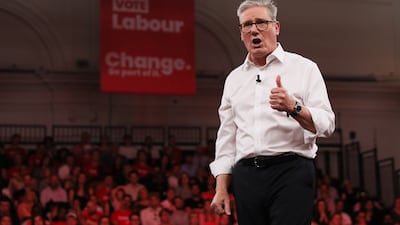With the UK due to vote later this week, Labour party leader Keir Starmer has a precious vase problem. He has campaigned on the precautionary principle of not dropping his lead in the polls. But experienced hands in government are now warning him that he should actually shed some votes to govern better, should he be installed in Downing Street at the end of the week.
Jonathan Powell, who was chief of staff under former Labour prime minister Tony Blair, confided last week that the entry into power is filled with pitfalls, describing his own early experiences in 1997 as a “post-euphoria and pre-delivery” trap.
In other words, there is a great danger of an immediate loss of momentum as the adjustment to party of government takes place.
Chris Patten, the former Conservative party chairman, offered the same advice from the other end of the spectrum, saying that he understands why Mr Starmer feels he has to get over the finish line without spilling his cargo at the last minute.
Live updates: Follow the latest news on the UK general election
But, according to Mr Patten, the “horrible problems” the UK faces mean that Mr Starmer should start showing the people the tough medicine he will need to administer. Otherwise, Mr Pattern thinks, people will come out of the election with expectations being higher than his government could possibly meet.
Mr Powell’s recommendation, one that was backed by the eminent pollster John Curtice, was that Mr Starmer finds time to make a keynote address in the final week, making plain what his government would be about. That would be a radical departure for a leadership that has been iron-willed in holding to its campaign strategy of making no second guesses on the outcome of the election.
The National’s own poll of UK voters showed that Labour has 42 per cent support while the Conservatives are on 20 per cent. Mr Curtice, in his remarks, said there was no hope of a Conservative comeback. In fact, he said that the electoral system was likely to over-reward the Labour party with parliamentary seats and punish the Conservatives. That is because the right is divided like never before since the rise of the Reform UK party.
WhatsApp communities that promote tactical voting against the Conservatives have emerged in recent weeks. These have boosted the chances of Labour and the other main opposition parties.
One scenario to look out for on Friday morning, once the votes have been counted, is whether the Liberal Democrats have roughly half the Conservative national vote share but a higher number of MPs, as is expected. This would make Ed Davey, a man who has so far campaigned by making outlandish stunts like falling repeatedly into a lake his main selling point, the official leader of the opposition.
People are talking about the election having a systemic impact. This is not least because there are five parties running candidates in nearly every seat. Comparisons are also being made with the eclipse of the Liberal Party by Labour in 1922.
In its findings, The National poll has made clear that the next government will be confronted with foreign policy issues, with some hard choices for it to make. These are not being reflected in a campaign that has seen exchanges on immigration and sewage in rivers.
Mr Powell points out that the first tasks of the new government will be dominated by questions on foreign affairs. In the first week, there will be a Nato leaders’ summit in Washington. Making the right points on Ukraine will be expected of the new team.
A week later, the UK will host the European Political Community summit at Blenheim Palace. Our poll demonstrated that there is strong support for the UK to re-join the EU by a margin of 46 per cent to 37 per cent, a double-digit gap.

It also showed that there was a groundswell of pressure for a change of direction on the Middle East and, in particular, the Palestine-Israel conflict. A demand for an immediate ceasefire (62 per cent support), followed by banning arms sales to Israel (54 per cent) and recognising an independent state of Palestine (45 per cent) all polled strongly. It is significant, too, that 32 per cent of respondents identified Gaza as an important issue for voters, a figure that rose above 50 per cent among voters aged under 34.
Those are the kinds of big decisions that swirl fluidly in front of a new government. With a mandate that allows for real domestic reforms, it can gain some breathing space from the daily pressures and the hot topics that arise.
The election campaign has, so far, managed to obscure the big-picture topics that are unaltered by what happens when the votes are cast. That is why Mr Powell worries that the new government must have a 100-day plan to accommodate these fundamental choices as well as the summits and timetables.
For Mr Starmer, the challenge of winning power cannot be said to match the intensity of facing the big decisions once ensconced in Downing Street. That’s why a big speech now would give him a sounder platform to govern.











